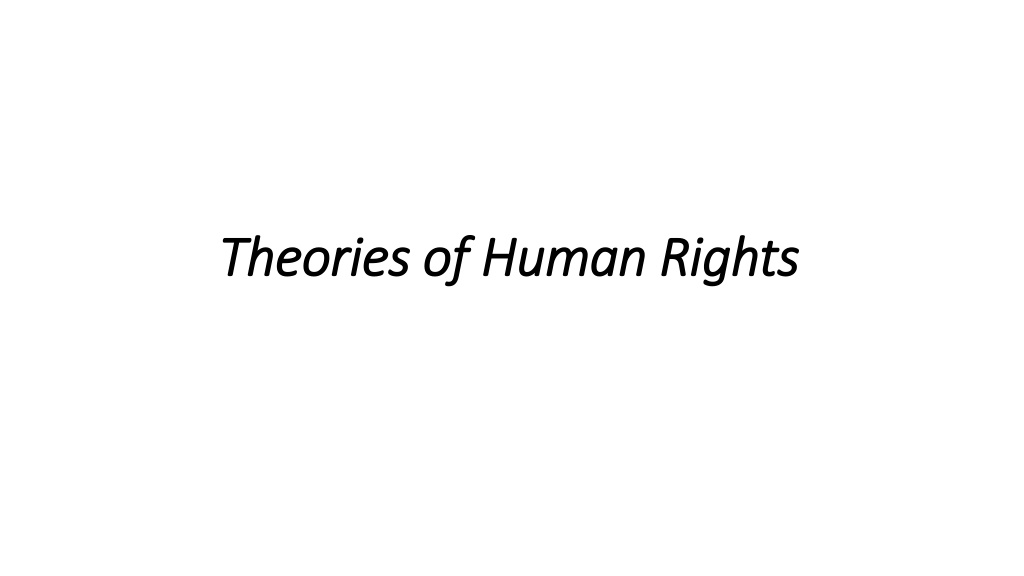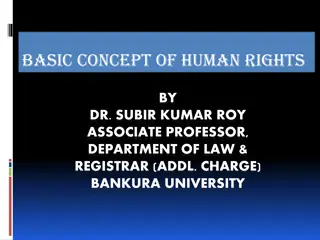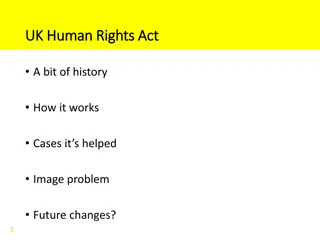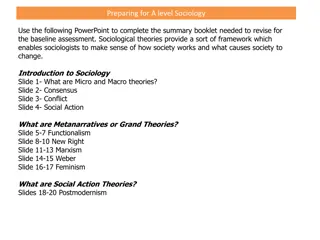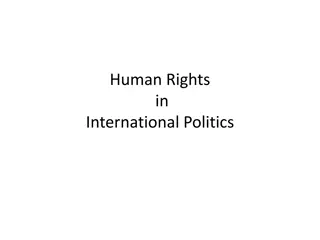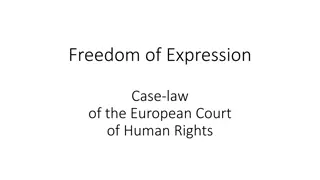The Evolution of Theories of Human Rights
The Theory of Natural Rights posits inherent rights in individuals, separate from the state, which are critical for moral development and self-realization. However, critics argue against the precedence of these rights over societal constructs. Modern interpretations by philosophers like T.H. Green emphasize the future-oriented nature of natural rights for enabling human potential. Furthermore, Laski's perspective integrates historical context and societal utility in understanding natural rights as essential for fulfilling the state's purpose.
Download Presentation

Please find below an Image/Link to download the presentation.
The content on the website is provided AS IS for your information and personal use only. It may not be sold, licensed, or shared on other websites without obtaining consent from the author.If you encounter any issues during the download, it is possible that the publisher has removed the file from their server.
You are allowed to download the files provided on this website for personal or commercial use, subject to the condition that they are used lawfully. All files are the property of their respective owners.
The content on the website is provided AS IS for your information and personal use only. It may not be sold, licensed, or shared on other websites without obtaining consent from the author.
E N D
Presentation Transcript
Theories of Human Rights Theories of Human Rights
1. Theory of Natural Rights: 1. Theory of Natural Rights: According to this doctrine of human rights, individuals enjoyed certain rights in the pre-political existence, which they called the state of nature . These rights are known as the natural rights. They are independent of and prior to the state. They do not depend for their validity upon the recognition and enforcement of the state. Man is born with them and they are inherent in him. They are as much a part of his nature as the colour of his skin and the power of locomotion. They are, therefore, inalienable or inseparable form man. The state cannot deprive any one of his natural rights. Rather, according to this view, the state was established only for their preservation and guarantee.
Criticism: Criticism: However, after French Revolution the old Theory of Natural Rights was more and more discarded by the writers. They raised the following objections against it: a) The term nature is confusing and vague. b) Rights are not prior to society and state. Because a solitary individual has no right but power. It is the state which creates those conditions in which an individual can exercise his power to act and develop his self and personality. c) Natural right means natural power or the unlimited freedom which is impossible in the society as it is limited by the equal rights of others and by the common good of society and state.
2. Modern Theory of Natural Rights: 2. Modern Theory of Natural Rights: T.H. Green, the idealist philosopher, explained natural rights by reference not to the past but to the future. He holds that they are inherent in the moral nature of man. They are the minimum basic conditions for moral development and self-realization. Man exists to realize the best in his nature. The state must create those conditions in which he can do so. These necessary conditions of moral development of human personality are the natural rights.
Laski also rejects the traditional historical element in the theory of natural rights. He says, They are historical in the sense, that at one given period and place, they are demanded by the character of its civilization, and they are natural in the sense that, under those same limitations (of time and place) the facts demanded their recognition. They are natural rights because they are useful to the ends the state seeks to serve. In this sense they are prior to state, because without them the purpose of the state cannot be fulfilled. They may not be recognized by the state but they demand recognition. Any given state is set between rights that have been recognized and rights which demand recognition, that is, between legal rights actually recognized and the ideal or natural rights demanding recognition . This view of natural rights is both correct and incontestable.
3. Legal Theory of Rights: 3. Legal Theory of Rights: The Legal Theory is just the opposite of the theory of Natural Rights. It was propounded by the jurists of the Analytical School of Law. Accordingly to them, the state does not recognize but actually creates rights. A right is that claim which is upheld by the force of the state upon the order of its court . It is the law or command of the sovereign and his authority that creates and maintains rights. Hence, there are no rights which are inherent in human nature. The state creates rights by formulating them, by defining their scope and by establishing law-courts and legal procedures to protect their enjoyment by the citizens.
Criticism: Criticism: The Legal Theory of Rights has been vehemently attacked on the following grounds: a) The state does not create rights, it merely recognizes them. b) Just as the state has rights against a citizen, he has also rights against the state. They are justifiable by a reference to common good which includes the good of all. c) A man has rights not only on his membership of the state but also of his other associations which are as real and as compelling as the rights of the state. d) Rights come not from law but from our sense of right and wrong, and when it changes, our rights change. They arise from the needs of our moral development. That is why, they are first moral and then legal.
4. Social Welfare Theory of Rights: 4. Social Welfare Theory of Rights: According to the Social Welfare Theory, rights are not independent of the society but inherent in it. They are correlative to such functions as contribute to the well- being of the society. They are related to individual happiness and personality, because the welfare of the community is built upon the happiness of the individuals. But on the other hand, one cannot have rights against public welfare because it is to give him rights against welfare which is really ultimately his welfare also.
Criticism: Criticism: Following objections have been raised against this theory: a) It does not provide us the criterion of defining social welfare. b) Sometimes under the pretext of social welfare the rights of the individual are taken away and his individuality suppressed. The result is the revolt of those persons and classes whose rights are denied or suppressed.
Conclusion: Conclusion: We considered several theories of the nature of rights. None of them explains rights adequately, but each of them has an element of truth. As the theory of natural rights and the idealist theory provide us with the necessary basis of personality and worth of the individual on which rights must be founded. But the rights must be related to social welfare, if personality is to develop properly. Rights exist in society and for its common good. This aspect of right is emphasized by the social welfare theory. Lastly, the legal theory emphasizes that moral, historical or functional aspects alone will not turn a claim into a right until and unless it is not recognized by the state and embodied in and enforced by law.
Source: Mazhar-ul-Haq. (-) Political Science: Theory and practice.
